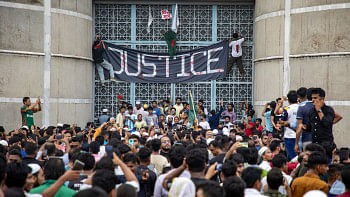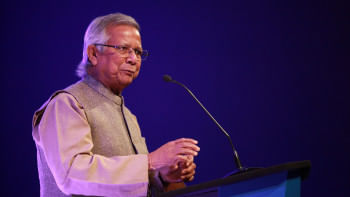How to get out of the constitutional gridlock?

Bangladesh witnessed arguably the largest student movement since its independence and as an outcome, the government led by the former Prime Minister Sheikh Hasina is no more in power. However, in the face of what we can term as "lack of objectively suitable conditions for dialogue," the transition is not going to be plain sailing. The lack of forethought for a smooth transition has also brought forth further violence, mayhem, and terror. Indeed, the process of transitioning into a new order is hanging in the balance. The interim government is expected to hold general elections for a smooth democratic transition. There is also this "academic" debate going on, on having a constitution-making or constitution-amendment episode—I seek to address both.
One of the motivations behind the discussion on a new constitution-making episode is the fact that the "interim" government will have to operate beyond the constitutional scheme since the current one does not endorse an interim or caretaker government. Indeed, an interim government will have to be seen as a revolutionary breach of legal continuity. However, justifying an interim government will potentially be a difficult, if not impossible, academic and judicial exercise. In any case, in order to come out of the gridlock, I do not see a new constitution-making episode as a solution; particularly because, among others, there was no such demand emanating from the movement to begin with. With the parliament now dissolved, there is no possibility of forming an interim government with members of the parliament either, as was suggested by some scholars.
Social movements are now a growing area of study within the paradigm of constitutional law. Particularly, in studying constitutionalism in Asia, social movements are relevant more than ever. Such movements often frame their strategies based on the texts of the constitution or to address the disharmony between the constitution and the lived realities of citizens at large (the Indian movement against 2019 Citizenship Amendment Act and the 2004 South Korean sex workers' movement are illustrative here). At times, social movements call for instating or redefining new structures or institutions within the constitution (the 1993 Indian movement for recognition of local self-government is an example). At other times, movements call for new and different interpretations of the texts of the constitution; differently again, certain movements call for revision or annulment of constitutions as well.
Ours was not a movement that explicitly relied on the texts of the Constitution of Bangladesh, although it did touch upon equality clauses. The hasty (judicial and executive) outcome of the movement has not really been a reflection of substantive equality (as it gravely fell short on protecting rights of women, Indigenous minorities, persons with disabilities, and gender-diverse populations). However, the initial demands did not call for something that goes or operates beyond the constitutional scheme. Later claims were political in nature (including the last one calling for the resignation of the then incumbent prime minister); however, those too did not call for remaking the constitution or challenging its basis.
It is reductionist to try to underscore an "essentialised" or "one true" purpose underlying social movements. Just as social movements are discursive bottom-up instances of mobilising, so are the purposes for social movement actors' engagement. However, at least the demands that surfaced were not ones that disregarded the constitutional framework. The movement certainly made certain "academic" discussion points to come to the front (including constitutional provisions to ensure firmer checks and balances among different institutions and specifying prime-ministerial/political term limits). These may in the longer run prove to be immensely useful to prevent perpetuation of power; however, whether they require a new constitution-making episode is an important question to ask.
Indeed, bringing in a new constitutional framework for a society divided along multiple axes (including religion, ethnicity, sex, and gender) requires time, labour, and massive efforts. In the current world order, wider public involvement is also deemed key to a legitimate constitution-making effort which can prove to be immensely cumbersome in the present context in Bangladesh. Also, in the shifting geopolitical reality, it may also prove to be difficult to withstand the pressure of interested international actors. Any haste would only prove to be counterintuitive in the longer run, particularly for failing to adequately address and accommodate concerns and needs of the non-dominant voices and minority communities.
The interim government may decide to go for substantive constitutional amendments for a smoother transition into and functioning of democracy. However, in such cases, there will be legitimate constitutional questions as to how an unelected "interim government" can exercise "derivative constituent power" and go on to amend the constitution. To stretch the revolutionary breach of legal continuity to such a point may also fail to withstand the constitutional test of time. Therefore, it would ideally be wiser to leave the task of amending the constitution to the next government. Alternatively, the interim government may formulate certain principles to potentially guide the constitution amendment episode by the next parliament.
In any case, for an inclusive society, I would want a steadfast commitment to secularism and as a feminist, commitment to equal rights between men and women in all spheres of life—instead of "in all spheres of state and public life" as appears in Article 28(2) that (unknowingly perhaps) calls for a rather conservative interpretation of women's right. However, for these changes in particular, amends need to be brought to the entrenchment of the basic structure doctrine (i.e., unamendability of certain provisions and parts of the constitution)—the process of doing so is the subject of a different constitutional discourse altogether.
We also need to be mindful to one of the core demands of the movement: of bringing an end to the culture of impunity and expediting the adjudicating processes for the brutal killings committed over the quota reform movement. Any attempt to bring in a new constitution would inevitably delay the process of serving justice to all those who were killed and tortured—both at the hands of the state apparatus and at the hands of other political elements at play.
Polities need to have certain non-negotiable ideals and values to stand by—the overwhelming deaths, including of children, over the quota reform movement, made me realise this the hardest way. Experiencing two nights without a government with news of condemnable brutality against police personnel, vandalisation of Hindu minority houses, and arson violence on Bangabandhu's historic Dhanmondi 32 residence, made me internalise it. My major scholarships have so far only critiqued our constitution. Nonetheless, the constitution we have does seem like a document that we should stand by firmly. Let's not lose out on the "constitutional moment" we had in 1971; because indeed, creating one is not as easy as we may theoretically assume. Also, a constitution can only do so much—we need a system that works.
Psymhe Wadud teaches law at the University of Dhaka and is in charge of Law Desk at The Daily Star.
Views expressed in this article are the author's own.
Follow The Daily Star Opinion on Facebook for the latest opinions, commentaries and analyses by experts and professionals. To contribute your article or letter to The Daily Star Opinion, see our guidelines for submission.

 For all latest news, follow The Daily Star's Google News channel.
For all latest news, follow The Daily Star's Google News channel. 











Comments